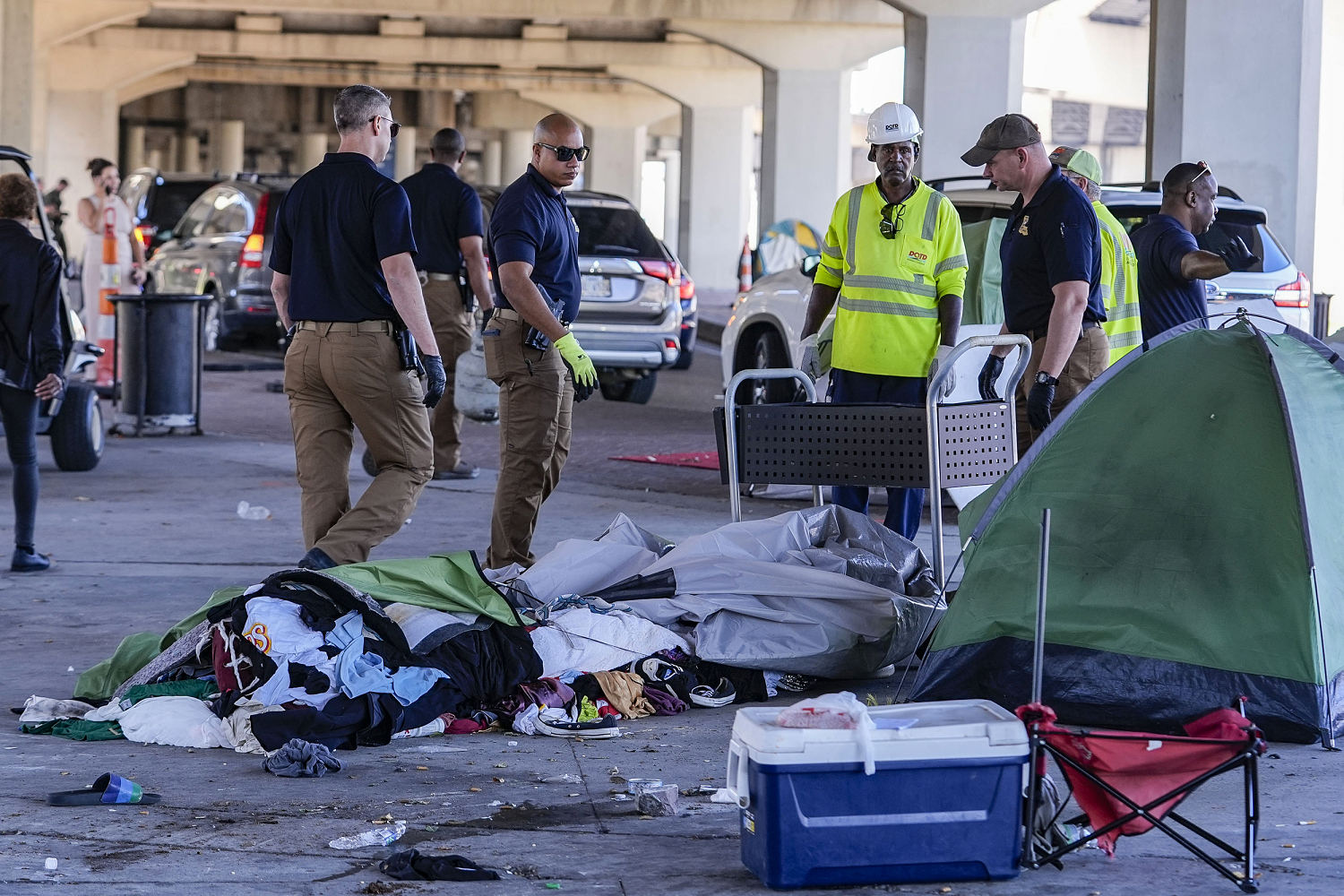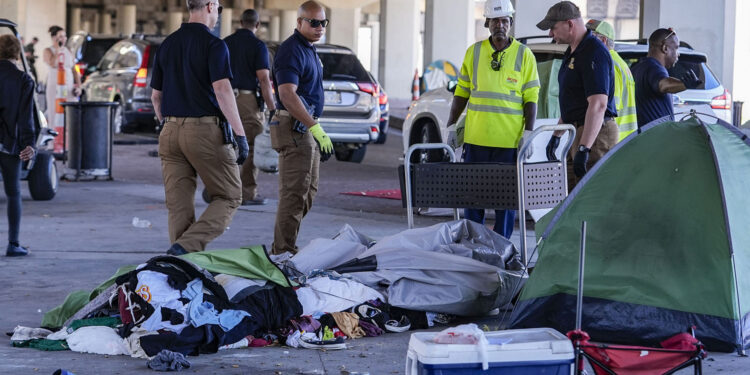
An encampment of unhoused people in downtown New Orleans was forcibly relocated by the order of Louisiana Gov. Jeff Landry ahead of this weekend’s Taylor Swift concerts, disrupting monthslong housing efforts with less than a week’s notice.
City Councilwoman Lesli Harris, who represents the district where the Caesars Superdome venue is located, told NBC News that she has been working with the state to close the encampment ahead of the city hosting February’s Super Bowl. Many of the roughly 75 people living in the encampment community — near the Superdome, where Swift will be performing — were on track to have housing by Thanksgiving, she added.
But despite months of collaboration, Harris only heard rumblings that Landry was considering a forced relocation last week. Swift publicly announced her New Orleans dates more than a year ago.
“It’s not like Taylor Swift all of a sudden decided to come to New Orleans,” Harris said. “That’s not a thing. We, as a city, knew that Taylor Swift was coming, but there wasn’t a conversation had other than last Friday.”
Kate Kelly, spokesperson for Landry’s office told NBC News affiliate WDSU that the governor understands that the homelessness crisis is the “number one issue” facing New Orleans and is working on solutions.
“As we prepare for the city to host Taylor Swift and Super Bowl LIX, we are committed to ensuring New Orleans puts its best foot forward when on the world stage,” Kelly said in a statement.
The governor’s office did not immediately respond to a request for comment from NBC News.
Harris said she and her staff walked the encampment early in the week with the head of the Louisiana State Police’s New Orleans office, noting that the community was well-kept and there were no signs of drug use or crime.
But on Wednesday morning, her team saw multiple state departments staging for the encampment’s removal. Harris said that the new location for the displaced individuals lacks basic hygiene facilities, including toilets and trashcans.
Asked about its involvement in the move, the Louisiana State Police said it is “committed to ensuring the safety of both the unhoused and the broader community while maintaining public infrastructure.”
“LSP Troop NOLA is supporting the relocation of the unhoused community to a centralized area that provides better access to services and ensures a safer environment,” a department spokesperson said.
State police did not immediately respond to questions on what was being done to address a lack of hygiene facilities at the new encampment or why those facilities were not in place prior to the move.
Last-minute upheaval disrupts months of progress
Harris noted multiple issues with the last-minute, “inhumane” decision. A number of the people who were relocated had vouchers in hand for residences, a part of the Home for Good initiative, according to Harris.
The project is a collaboration between the city, non-profit organizations and private donors. Harris said that case workers do targeted outreach in encampments to work with people, many of whom are employed, to get them access to safety and pet deposits as well as working with landlords to incentivize them to take in unhoused individuals.
Six encampments have already been closed down, according to the Home for Good website, with nine others projected to be closed by the end of the year. Harris said the city has been able to get just shy of 600 people into homes this year.
“So this is working, what we’re doing is working,” Harris said. “And to have someone just come and interfere and meddle in a system that’s working, and actually getting people housed and the services that they need is just deeply upsetting.”
And Harris said people had their personal items moved without their knowledge.
One person had been working with was at his shift at Burger King at the time of the move and has been unreachable, she said, since he does not have a cell phone. Harris also referenced a report from Nola.com, where a man named Joseph Neiswander came back from a walk to find all of his belongings missing, including his personal documents and phone.
“When a homeless person loses their documents, that means that they have to start at step one by getting basic documents, like a state ID, social security card,” Harris said, noting those documents get them into the system for housing.
Local officials like Harris also warned that many of the people would not stay in a new encampment, especially as authorities sweep unhoused individuals from other areas into this new location.
New Orleans Council President Helena Moreno wrote a letter to Landry’s office on Wednesday, WDSU reported, urging the governor to work with the city on a unified approach to the housing issue.
Nathaniel Fields, the city’s director for homeless services, told Nola.com that the city does not have the resources to keep the new encampment safe. He said he sweep will scatter the community and complicates the larger effort to have all the encampments closed by 2025.
“I thought we could work better with our state partners on this, but I guess we just do things the way they wanted to do them,” Field told the outlet.
Harris also noted that the state had months to give notice, but now the rushed effort before Swift’s shows is essentially “taking her name in vain.”
“There was no coordination with the city, and suddenly we are rounding up people to put them in a concentrated area with no services because of a Taylor Swift concert … the governor is essentially just sweeping what he conceives of as trash into a corner,” Harris said.







